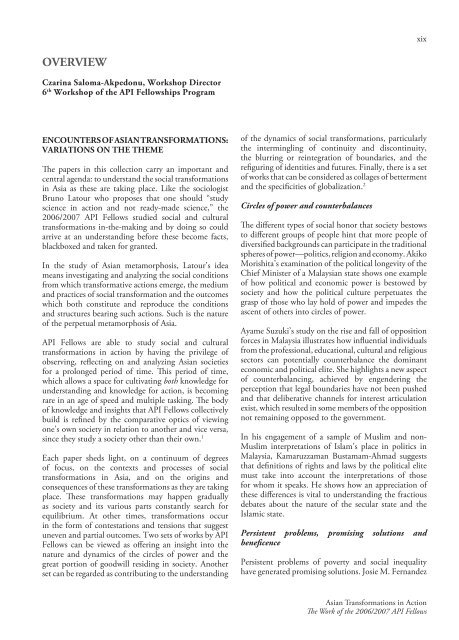Asian Transformations in Action - Api-fellowships.org
Asian Transformations in Action - Api-fellowships.org
Asian Transformations in Action - Api-fellowships.org
Create successful ePaper yourself
Turn your PDF publications into a flip-book with our unique Google optimized e-Paper software.
xixOVERVIEWCzar<strong>in</strong>a Saloma-Akpedonu, Workshop Director6 th Workshop of the API Fellowships ProgramENCOUNTERS OF ASIAN TRANSFORMATIONS:VARIATIONS ON THE THEMEThe papers <strong>in</strong> this collection carry an important andcentral agenda: to understand the social transformations<strong>in</strong> Asia as these are tak<strong>in</strong>g place. Like the sociologistBruno Latour who proposes that one should “studyscience <strong>in</strong> action and not ready-made science,” the2006/2007 API Fellows studied social and culturaltransformations <strong>in</strong>-the-mak<strong>in</strong>g and by do<strong>in</strong>g so couldarrive at an understand<strong>in</strong>g before these become facts,blackboxed and taken for granted.In the study of <strong>Asian</strong> metamorphosis, Latour’s ideameans <strong>in</strong>vestigat<strong>in</strong>g and analyz<strong>in</strong>g the social conditionsfrom which transformative actions emerge, the mediumand practices of social transformation and the outcomeswhich both constitute and reproduce the conditionsand structures bear<strong>in</strong>g such actions. Such is the natureof the perpetual metamorphosis of Asia.API Fellows are able to study social and culturaltransformations <strong>in</strong> action by hav<strong>in</strong>g the privilege ofobserv<strong>in</strong>g, reflect<strong>in</strong>g on and analyz<strong>in</strong>g <strong>Asian</strong> societiesfor a prolonged period of time. This period of time,which allows a space for cultivat<strong>in</strong>g both knowledge forunderstand<strong>in</strong>g and knowledge for action, is becom<strong>in</strong>grare <strong>in</strong> an age of speed and multiple task<strong>in</strong>g. The bodyof knowledge and <strong>in</strong>sights that API Fellows collectivelybuild is ref<strong>in</strong>ed by the comparative optics of view<strong>in</strong>gone’s own society <strong>in</strong> relation to another and vice versa,s<strong>in</strong>ce they study a society other than their own. 1Each paper sheds light, on a cont<strong>in</strong>uum of degreesof focus, on the contexts and processes of socialtransformations <strong>in</strong> Asia, and on the orig<strong>in</strong>s andconsequences of these transformations as they are tak<strong>in</strong>gplace. These transformations may happen graduallyas society and its various parts constantly search forequilibrium. At other times, transformations occur<strong>in</strong> the form of contestations and tensions that suggestuneven and partial outcomes. Two sets of works by APIFellows can be viewed as offer<strong>in</strong>g an <strong>in</strong>sight <strong>in</strong>to thenature and dynamics of the circles of power and thegreat portion of goodwill resid<strong>in</strong>g <strong>in</strong> society. Anotherset can be regarded as contribut<strong>in</strong>g to the understand<strong>in</strong>gof the dynamics of social transformations, particularlythe <strong>in</strong>term<strong>in</strong>gl<strong>in</strong>g of cont<strong>in</strong>uity and discont<strong>in</strong>uity,the blurr<strong>in</strong>g or re<strong>in</strong>tegration of boundaries, and therefigur<strong>in</strong>g of identities and futures. F<strong>in</strong>ally, there is a setof works that can be considered as collages of bettermentand the specificities of globalization. 2Circles of power and counterbalancesThe different types of social honor that society bestowsto different groups of people h<strong>in</strong>t that more people ofdiversified backgrounds can participate <strong>in</strong> the traditionalspheres of power—politics, religion and economy. AkikoMorishita’s exam<strong>in</strong>ation of the political longevity of theChief M<strong>in</strong>ister of a Malaysian state shows one exampleof how political and economic power is bestowed bysociety and how the political culture perpetuates thegrasp of those who lay hold of power and impedes theascent of others <strong>in</strong>to circles of power.Ayame Suzuki’s study on the rise and fall of oppositionforces <strong>in</strong> Malaysia illustrates how <strong>in</strong>fluential <strong>in</strong>dividualsfrom the professional, educational, cultural and religioussectors can potentially counterbalance the dom<strong>in</strong>anteconomic and political elite. She highlights a new aspectof counterbalanc<strong>in</strong>g, achieved by engender<strong>in</strong>g theperception that legal boundaries have not been pushedand that deliberative channels for <strong>in</strong>terest articulationexist, which resulted <strong>in</strong> some members of the oppositionnot rema<strong>in</strong><strong>in</strong>g opposed to the government.In his engagement of a sample of Muslim and non-Muslim <strong>in</strong>terpretations of Islam’s place <strong>in</strong> politics <strong>in</strong>Malaysia, Kamaruzzaman Bustamam-Ahmad suggeststhat def<strong>in</strong>itions of rights and laws by the political elitemust take <strong>in</strong>to account the <strong>in</strong>terpretations of thosefor whom it speaks. He shows how an appreciation ofthese differences is vital to understand<strong>in</strong>g the fractiousdebates about the nature of the secular state and theIslamic state.Persistent problems, promis<strong>in</strong>g solutions andbeneficencePersistent problems of poverty and social <strong>in</strong>equalityhave generated promis<strong>in</strong>g solutions. Josie M. Fernandez<strong>Asian</strong> <strong>Transformations</strong> <strong>in</strong> <strong>Action</strong>The Work of the 2006/2007 API Fellows
















